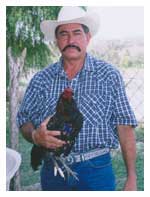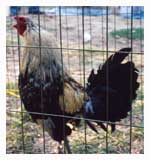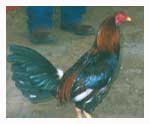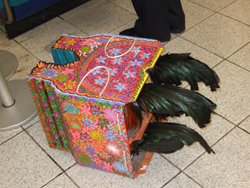|
Barbara Joan Schaffer
A COCKFIGHT IN THE BARRA DE COLOTEPEC
Two fighting gamecocks embracing in the air, their
feathers ruffled and erect, appear to be one mythical bird of outstanding
beauty or the archetype for a kung-fu movie.
Cockfights are one of the features of Mexican holiday
celebrations, and I attended my first one in May at the fiesta in the
Barra de Colotepec. It was better and worse than I had expected. I’d
seen cockfights in films where they’d seemed rather sinister and
tawdry events, but I had Mexican friends in the States who were perfectly
nice people who had raised gamecocks. So was it family fun or a macho
guy thing? Cruelty to animals or animals having fun? And would I experience
an adrenaline rush by betting on a rooster?

Barra de Colotepec,
Santa Maria Colotepec,
Oaxaca Mexico
May 2006
The palenque (cockfight arena) was a patch of dirt
circled by portable wooden barriers just the right height and width
to set a plate or a bottle of beer on if you were sitting on a folding
chair in the front row, as my party and I were. The venue was a farm
on the riverside. A cow was grazing under a tree, the river flowed gently
and the mosquitoes were everywhere frolicking happily. Admission was
70 pesos. We got there way too early, around 5:30, but we did get great
seats and were able to buy some really good barbequed stew for 30 pesos.
We watched as the cocks were taken out of their traveling cartons and
put in their cages.

My first surprise was how beautiful the cocks were:
the colorful plumage was to die for. They looked nothing like barnyard
roosters. I know these animals have been bred for generations for their
aggressiveness, not something you want to see in a hen house, and maybe
their feathers, which male birds display for females, reflected their
pugnacity.

Of course, no bird in the wild could ever be as well
fed or groomed as these were. If they are good they may live to fight
three or even four times, after which they are put out to stud.
Around 8 p.m. the weigh-in began. A veterinarian weighs
each cock, tags a number to its leg and puts on the spurs. There are
three weight groups and cocks only fight inside their category. Ten
breeders were represented. Each was given a number. The number and the
name of the ranch were written on a large sheet of paper and each of
these papers was posted around the ring. Then there was a drawing to
determine which cocks within each weight category would fight with which.
It was also announced that if any breeder lost both fights in the first
two rounds he would be disqualified from participating in the final
two rounds. I don’t know if this rule was to limit the number
of fights or if it’s to assure that the breeders didn’t
save their best birds for last.
When the first fight was finally announced, the two
cocks were brought out by their trainers on opposite sides of the ring.
They were held lovingly and then allowed to strut so we could see their
gait. Then they were picked up and confronted with a teaser or prep
cock which the referee brought around to show the spectators how aggressive
they were.

Game Cocks - Oaxaca
Now it was time to place a bet. We had thought the
wagers would be 200 pesos, but the minimum on the first fight was 400
pesos - too rich for our blood. The man in charge of collecting the
bets did not disappoint. He was straight out of the movies I’d
seen: thin, middle-aged, wasted, bored, but still devilishly handsome.
When we told him we’d pass on this fight he went into a rap right
out of B. Traven about life being short, too short not to take a chance.
It was not very convincing, but it was nice to hear. Pedro, the lone
Mexican in our party of four and the only one who knew anything about
cockfights, urged us to bet on green - the cock was experienced, the
breeder and trainer well known, but even so we demurred. Green won.
Betting is very simple; each cock in each fight is
designated as either green or red. You just bet on the color. The problem
is that each bet has to be matched; there are no odds. Following Pedro’s
advice we decided to bet on green in the second round, but no one was
betting on red and our bet wasn’t taken. Or, better said, whenever
someone bet on red, the green bet was given to someone else. We were
being punished for not having bet before.
Meanwhile the palenque had filled up. There were at
least 100 people, families with children, groups of teenage girls, some
with boyfriends, boys and men of all ages. It became unbearably hot;
everyone was wiping their brows.
Pedro had explained that experienced cocks were a safer
bet than novices. After each fight, the birds, if they survived, were
stitched up and nursed back to health with the help of specialist veterinarians.
So he counseled us to bet on the veteran in the third round, who happened
to be green again. But they weren’t accepting any bets on green.
“On the other hand,” Pedro said, “Red looks good.
I like the way he keeps his feet together when he jumps in the air.”
So John, a surfer from Colorado, and I each put up 200 pesos and bet
on Red.
It was a long drawn-out combat, all on the ground,
and it was obvious early on that Red had no chance. Every once in a
while the fight would stop, the trainers would smooth their bird’s
feathers and then it would start again. There was a count, and Red stayed
down. But still the fight was not over. Red’s owner would not
admit defeat. The cocks were put in the chalked-off circle in the middle
of the ring. Green didn’t have much fight left in him either,
but he did manage to knock Red down again for another count. The crowd
was subdued; people don’t cheer on the competitors in cockfights
as they do in boxing matches or horse races. This time Red’s head
was on the ground for the count of ten. The bet collector came around
and picked up the four hundred pesos which had been sitting on the barrier
in front of us all the while. He didn’t say a word. We left soon
after; we had no more money to bet and it was very, very hot.
|